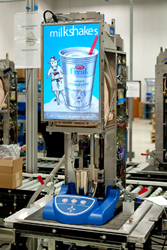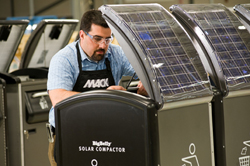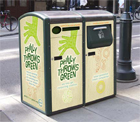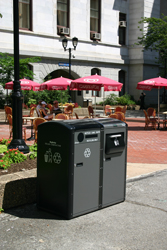The selection of case studies shown below represents only a few examples of Mack’s sheet metal fabrication services and how they have helped customers resolve challenges and move product to market. It is not intended to provide a comprehensive listing of Mack’s involvement in any industry.
Retail Self-Serve Blender
F’real Blender: Self-serves, Self-cleans
Simplified Supply Chain Critical to Launch
F’real® Foods, LLC, is a frozen blended beverage company that sells milkshakes, smoothies and frozen cappuccinos to convenience stores, along with a self-serve blender for its patrons to use. F’real began marketing its frozen blended beverages in 2004, along with its first generation self-serve blender, which Mack builds. The company wanted to launch a new blender, however, that would meet the following four objectives:
 1. Develop a fully automated self-cleaning blender that would not require hands-on cleaning or sanitizing by store personnel.
1. Develop a fully automated self-cleaning blender that would not require hands-on cleaning or sanitizing by store personnel.
F’real wanted to completely remove the human element from the blender sanitizing process by adding a software-driven, automatic, steam-cleaning process with the pre-wash, steam sanitize and cool-down cycles all managed through the software. To the company’s knowledge, there is no other piece of food equipment used in a retail environment that has an automated cleaning and sanitizing process.
2. Use the new blender to more effectively merchandise its product (the frozen beverage).
Because F’real’s business model is built on recurring revenue from blending shakes and selling frozen beverages, the blender is all about selling more beverage cups. Therefore, to achieve a more commanding presence on the retail counter (where real estate is at a premium), F’real designed its new blender to be about 12″ taller than the original version, and added a 22″ touch screen LCD on the front to attract attention. Because of its moving, digital content, the screen grabs attention and brings consumers in. It gives first-time users quick instructions, coupled with detailed animation on how to use the blender. And because the blending process takes just under a minute, F’real serves up fun, brand-building content during that time, educating the consumer about the company, its products, nutritional information, and how to contact them.
3. Build in a service alert system that would allow F’real to communicate with the blender remotely.
By adding a 3G modem driven, F’real can now be alerted in real time if there is ever a blender malfunction in the field. F’real can tunnel into the blender to see details about how the blender has been operating, troubleshoot issues, or forecast potential future issues. With the modem, F’real can also push new digital content out to the screens – even customize it by region, store, chain, etc.
4. Improve and simplify aspects of the original blender for the new version.
Because the new blender is a totally new design rather than an update of the older version, F’real wanted to improve and simplify aspects of the blender as appropriate. For example, the mix motor on the new version is now directly in line with the mix motor shaft, eliminating the previous need for a belt-driven system with more parts, costs, etc.
The new blender project supports F’real’s overall business strategy of selling as many milkshakes, smoothies and frozen cappuccinos as possible by improving its presence with a larger size and LCD screen to better connect with consumers; and by adding remote communication to diagnose issues and, in some cases, proactively prevent issues from happening, making the blender even more reliable in the field. Attracting more buyers for their retailers and reducing downtime so the blender is up and running at all times, goes directly to the bottom line of both F’real and its customers.
Mack’s Involvement
Contract manufacturing, F’real blenderF’real chose Mack as its manufacturing arm in order to get to market quickly with as simplified a supply chain as possible. Already building its original blender, Mack worked through multiple pilot builds with F’real and managed numerous engineering changes to speed the product to market.
Mack’s vertical integration satisfied the simplified supply chain requirement, offering:
- Upfront design-for-manufacturability studies for both plastics and metal
- External gas-assist molding for the plastic skins
- Sheet metal fabrication
- Full product assembly
- Supply management that supports both quality and procurement practices for over 400 unique parts from 63 suppliers
- Robust ISO-certified quality management systems
- Distribution.
F’real products are now available in over 4,000 retail locations in 47 states across the U.S. To satisfy your cravings, go to www.frealfoods.com for the F’real product nearest you. Enjoy!
For more information, contact: salesnorth@mack.com.
F’real® is a registered trademark of F’real Foods, LLC.
………………………………………………………………..
Solar Powered Trash Compaction
Solar-powered Trash Compaction: Cheaper than Collection
- BigBelly holds up to five times the volume of ordinary trash receptacles.
- Big Belly can displace four out of five trash pick-ups, dramatically reducing transportation and labor costs.
- BigBelly reduces greenhouse gas by 80%.
- BigBelly can hold 160 gallons of trash.
- BigBelly gets 100% of its energy from the sun and uses less than 5 watt hours/day.
So what is BigBelly? The world’s first solar-powered trash compactor. And today, thousands have been sold across the U.S. and in 17 countries around the world.
About the product
Instead of requiring a grid connection, BigBelly’s solar photovoltaic panel turns daylight into electricity, which is stored in a small battery inside the unit. This allows the machine to run at night and during prolonged periods of inclement weather.
Similar in size to an ordinary trash receptacle, its capacity is five times greater (160 gallons) because of compaction. Increased capacity reduces collection trips and can cut fuel use and greenhouse gas emissions by 80 percent. BigBelly can displace four out of five trash pickups, dramatically reducing transportation and labor costs.
When the unit is ready for collection, a wireless monitoring system uses text message technology to signal a web-based database that the unit is full. This allows managers to optimize collection efficiency on a real-time basis.
Optional recycling units can be attached to the compactors to separate trash from recycling. Both units have the same overall design and appearance, but the recycling units are non-compacting with 50-gallon inner bins.
Mack’s Involvement
 Mack molds the solar bubble of high-impact, UV-resistant polycarbonate resin, which must be perfectly clear to expose the solar panel below to the sun. Mack also fabricates the back panel and door out of metal, procures over 150 unique parts, and totally assembles both the compactor and recycler for direct shipment to BigBelly Solar’s customers.
Mack molds the solar bubble of high-impact, UV-resistant polycarbonate resin, which must be perfectly clear to expose the solar panel below to the sun. Mack also fabricates the back panel and door out of metal, procures over 150 unique parts, and totally assembles both the compactor and recycler for direct shipment to BigBelly Solar’s customers.
Built to order, the product is highly customizable and can include custom paint; silk-screened logos or artwork; vinyl wraps with custom artwork, stickers, and advertising panels; cigarette snuff plate; bear latch and hot weather handles; two different fronts (paper or can) for the recycling units, and wireless technology.
Philadelphia Case Study
Recently, the city of Philadelphia replaced 700 regular trash receptacles with 500 solar-powered trash compactors and 210 single-stream recycling units. Now, rather than making 17 trips each week to empty 700 receptacles (annual cost: ~$2.3 million), the city now collects only five times per week at an annual operating cost of approximately $720,000 – a 70% savings. Performing 17 collections each week required 33 workers on three shifts; five collections per week under the new program require only nine workers on a single shift. The other workers have been reassigned to other, more productive tasks.
 Highlights of the program include:
Highlights of the program include:
- BigBelly Solar CompactorImmediate savings: By entering into a three-year financing arrangement, the city has no up-front capital cost and will realize collection cost savings in the first year of approximately $850,000.
- Ongoing savings: Philadelphia will save nearly $13 million in cumulative collection cost savings over the next 10 years, net of the equipment cost.
- Annual operating cost reduction of 70%: Compaction reduces collection demand, which directly reduces operating costs and associated vehicle fuel use and emissions.
“As the global cry for alternative energy sources heightens, we are especially proud of the work we did with BigBelly Solar to transform this award-winning, solar-powered product from concept to reality,” says Jeff Somple, president of Mack Molding’s Northern Operations. “It derives its energy from the sun, significantly reducing fossil fuel consumption and greenhouse gas emissions. It is gaining widespread interest, as waste management is an everyday issue that spans the globe. And it has done all this while creating ‘green’ manufacturing jobs right here in Vermont.”
For more information, contact: salesnorth@mack.com.
